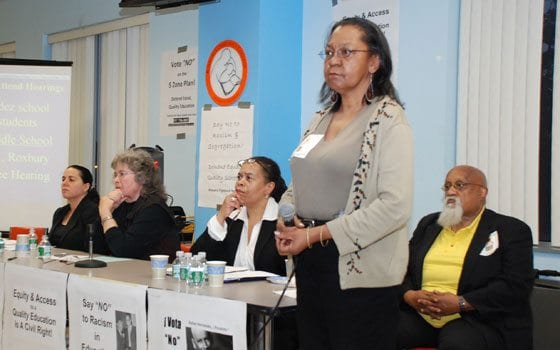
Concerned parents, educators and activists packed the student center at Roxbury Community College last Thursday night to discuss a controversial proposal to change the way students are assigned to the Boston Public Schools (BPS) — a proposal that some critics say could open the door to resegregation.
As it stands, families applying for their children to be admitted to city schools for prekindergarten through eighth grade can select a school from one of three “assignment zones,” as well as any school within a certain distance of their home. Under the new plan, first proposed in February, those three territories would be broken into five smaller zones, each encompassing fewer neighborhoods.
In a series of community meetings about the proposal held across the city this month, BPS Superintendent Dr. Carol R. Johnson has trumpeted the “walkable communities” that would be created through the switch to a five-zone plan, saying parents with children in schools closer to their home will be more likely to get involved in the school community.
There’s also a financial incentive to the plan, proponents argue. Sending students to “neighborhood schools” means fewer kids would need transport across the city, theoretically saving the city money on transportation.
Savings of any stripe are crucial for the BPS these days. Facing citywide revenue shortfalls, Johnson in February submitted a scaled-back budget proposal for fiscal year 2010, which cut more than $20 million and 530 jobs out of the system’s spending plan, including more than 200 classroom positions.
Critics claim, however, that the reassignment proposal would handcuff city parents, as smaller assignment zones mean fewer public school options.
“Students need resources,” said Jose Lopez, a member of the Coalition for Equal Quality Education, which organized last Thursday’s meeting. “Right now, we’re shrinking their access to obtain resources.”
But the biggest problem may lie beneath the surface. Opponents say that instituting a policy that emphasizes neighborhood schools could have an overly negative effect on communities of color, possibly even bringing Boston back to an ugly past of “separate but equal” education.
“Let’s not be seduced by the talk of walking to school and neighborhood schools,” said City Councilor Charles C. Yancey. “Let’s call it what it is — segregated schools.”
Nora Toney, principal of the Ellison/Parks Early Education School in Mattapan and president of the Black Educators Alliance of Massachusetts, noted that sending students to schools near their homes doesn’t benefit kids if those schools aren’t up to snuff.
“We’re talking about keeping kids in their neighborhoods and in schools that are not high-quality schools,” she said.
According to the coalition, the reassignment plan would cluster “Commonwealth Priority schools” — the state Department of Education’s term for institutions it deems “underperforming” — in zones 3, 4 and 5. Those zones include a number of neighborhoods with large minority populations, like Roxbury, Dorchester, Mattapan, Jamaica Plain and the South End.
Mary Jo Hetzel, a member of the advocacy group Work 4 Quality Schools/Fight 4 Equity, said the five-zone plan “flies in the face of Boston Public Schools’ own stated goal of reducing the achievement gap” for city students.
City Councilor Chuck Turner recalled two similar attempts to alter the BPS assignment policy over the past decade, which ended with assurances from Mayor Thomas M. Menino that the city wouldn’t proceed with adjustments until a system was proposed that all parties deemed fair.
“The reality is that if the [Boston] School Committee adopts the five-zone plan as it is currently constituted, not only will we go backward, but we were lied to,” Turner said.
Mayoral hopeful and City Councilor-at-Large Sam Yoon stressed that despite reports to the contrary, he does not support the five-zone plan, which he called an example of the “divide-and-conquer politics that Boston is so famous for.”
While state Rep. Marie St. Fleur echoed her fellow elected officials’ opposition of the reassignment plan, she struck a more measured tone.
“I know you talk about what we don’t want, but we need to talk about what we do want. It needs to be a two-way street,” St. Fleur said. “Besides saying no, what is the alternative?”
St. Fleur said she couldn’t support the plan because she does not yet “understand what the impact will be for our community,” but noted that the city’s difficult financial situation means that policy alterations will likely have to be considered.
“There has to be change,” she said. “But there also has to be a conversation about what that change will be.”
For his part, Turner argued that fairness must take precedence over economic considerations.
“We have to say … that yes, finances are difficult; yes, we have to use the scarce resources in the best way possible,” Turner said. “But the best way is to look toward a plan that has equity. … [And] we’re not there now.”
Johnson will deliver her recommendation to the School Committee during its Wednesday, June 3, 2009, meeting. The Coalition for Equal Quality Education is planning to demonstrate outside of the committee’s offices at 26 Court Street that day to voice their opposition to the plan.
The committee is scheduled to take its final vote on the plan on June 24.






